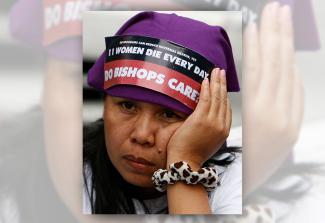Comment
Bishops versus majority
By Alan C. Robles

During the 333 years that the Philippines was a Spanish colony, it was run like a theocracy by the Catholic church. It seems a three-century habit is hard to lose: the Church still tends to behave as if it can dictate on the lives of every Filipino.
The latest example is its implacable opposition to a Reproductive Health (RH) bill that the administration of President Benigno Aquino is trying to enact into law. The bill aims to provide free information and health care services to Filipinos to enable them to plan their families to the size they want. There is no compulsion, no limits to the number of children a family can have, no population targets.
The Church will have none of it. Declaring that “contraception is corruption” and the RH bill “anti-life”, the Catholic Bishops Conference of the Philippines (CBCP) has ordered priests throughout the nation to constantly inveigh against the reform. It has mobilised its allies in Congress – politicians who profess to be devout Catholics – to scuttle the bill.
Actually, because of the Church’s pressure, Congress had been sitting on the RH bill for more than a decade. But when he was elected in 2010, Aquino made reproductive health a priority issue. He has since exerted so much political pressure that the bill has been pushed to the final stages of discussion in Congress.
The reform is needed not only because the Philippines has one of the world’s fastest population growth rates (slightly over two percent) but also because survey after survey has shown that Filipinos themselves want such a law. While contraceptives are available in pharmacies, the poor can’t afford them and don’t know how to properly use them. As a result, most Filipinos who want to plan their families rely on hearsay and superstition, with priests constantly telling them that large families are a “blessing.”
About 82 % of the country’s population of 100 million is Catholic, a figure that probably misleads the Church into believing that they are sheep that need to be ordered around. But one Jesuit scholar has noted that historically the Church only has clout and influence when its position happens to be identical to that of most Filipinos. In this case it is not. Moreover, if the bishops get their way, they will impose their beliefs on all Filipinos, including those who aren’t Catholic. As D+C/E+Z went to press in mid-November, it was impossible to predict how this legislative drama would unfold.
The Church’s own sense of politics and priorities can be sensed in a remark which one CBCP official made to a journalist two years ago. The Church, he said in many words, would prefer to see a criminal and corrupt person elected to office rather than someone who supports the Reproductive Health bill.








